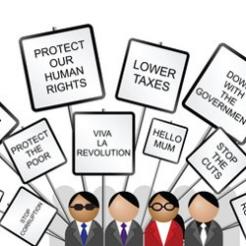Charities' abilities to bring judicial reviews will be reduced to ‘zero’ under new proposals from the government, a lawyer warned yesterday at a hearing with the Independence Panel.
Last month, Justice Minister Chris Grayling controversially launched a consultation on judicial reviews, saying that they were being used as a “promotional tool for countless left-wing campaigners”, including charities.
Speaking at a hearing of the Independence Panel yesterday, Ravi Low-Beer, from the Public Law Project, said the new proposals in the consultation would diminish the ability of charities to bring a judicial review to almost ‘zero’.
Low-Beer said that under the current rules the means of describing who is able to bring a judicial review claim was deliberately flexible:
“Under the statutory test one has to have “sufficient interest”. The courts have traditionally applied this liberally because if there were rigid rules, judges have said some cases would never be heard. Therefore you have a flexible test as the primary purpose of judicial reviews is to prevent abuses of power.”
Low-Beer warns that under new proposals, only an individual with a “direct interest” in a case, would be able to bring a judicial review.
“This is more restrictive than currently. It may appear benign, but it is problematic. Sometimes an individual directly affected by an unlawful state act cannot be found.
“Even if they are found it is difficult for them to raise points not raised by an individual case as a big policy challenge could only apply to bits affecting them.
“It would be very hard to bring a case for a wide generic policy.”
Independent of judiciary from the executive is essential
Also speaking at the event, Shauneen Lambe, a lawyer from Just for Kids Law, said that she was shocked by Grayling’s comments on judicial review.
“The independence of judiciary from the executive is fundamentally important,” she said. “This consultation is a short-term, knee-jerk reaction.
“Perhaps it will be ok under a benevolent government. But this might not always be the case that we will have a government in power which looks after its citizens. We need people to challenge things. This goes back to the Magna Carta."
She continued that the role of charities and civil society was to provide a voice for those who did not know what they were entitled to and it was essential these groups had fair access to judicial reviews.
“We need a system where the future Jews, or homosexuals, or gypsies are given access to courts,” she said.
During the question session at the event, Andy Benson, from the National Coalition of Independent Action, asked if what he perceived as a “chilling attempt to outlaw dissent”, through proposed changes to judicial reviews and lobbying, was by accident or "evil intent" by the government.
Suggesting it was the latter, he continued. “This is an attempt by government to create an environment where people are discouraged from taking appropriate action because of a lack of certainty
“There is an inate conservatism of British society and the charity sector. But surely goodwill is running out and we need to develop effective forms of resistance.
Low-Beer responded that the “politicisation of access to justice” was something he had not seen before.
“The way the Grayling equated judicial reviews with the Left was a surprise to many, as this is something those on the Right are also keen to protect, such as the Countryside Alliance.”
The Indepedence Panel is a group of voluntary sector leaders established in 2011 to protect the independence of the voluntary sector.
It heard yesterday from a range of individuals including, minister for civil society Nick Hurd and Sam Younger, chief executive of the Charity Commission.









